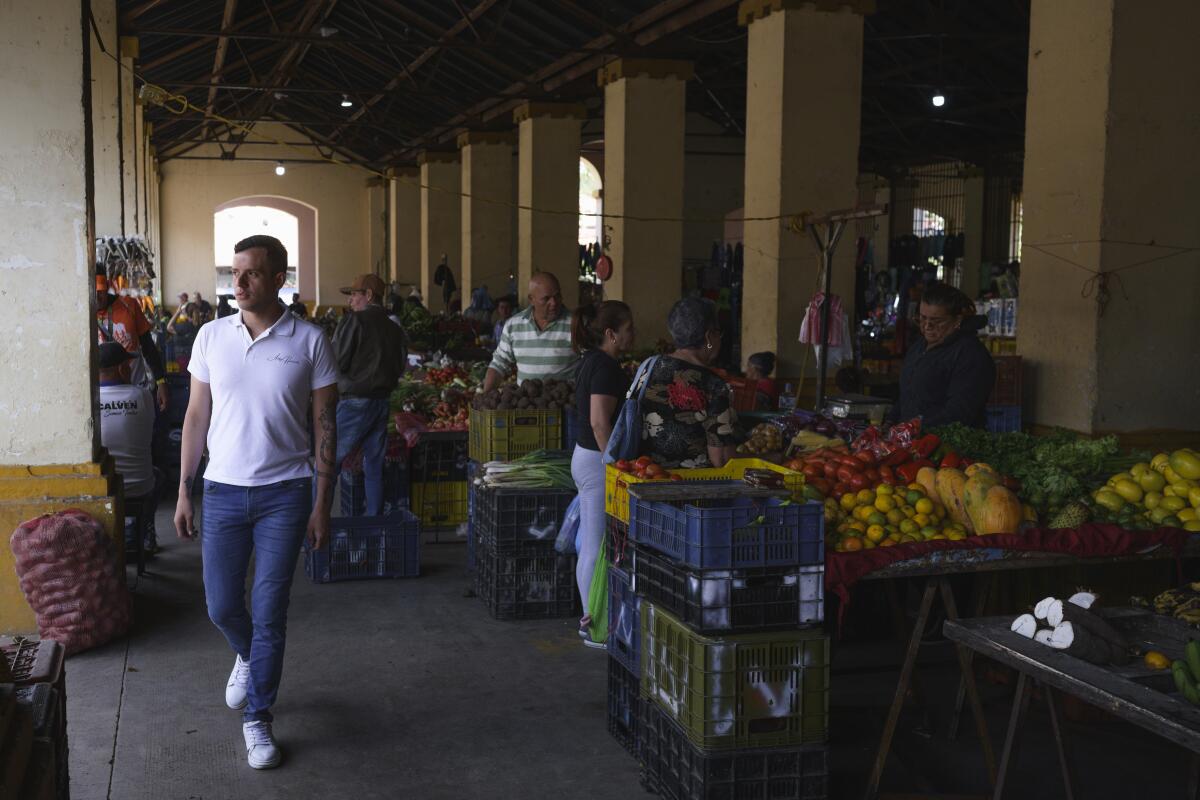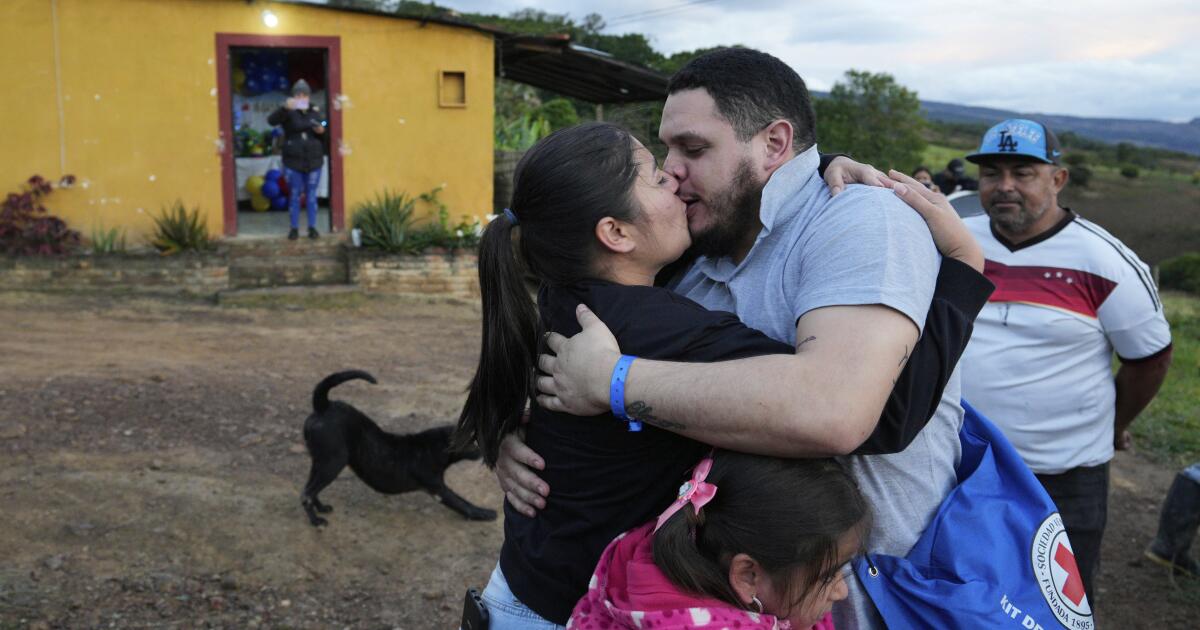‘Is being gay a crime?’ Venezuelan makeup artist rebuilds life after 125 days in El Salvador prison
When a door slammed shut in the childhood home of Andry Hernández Romero, he wasn’t just startled. He winced, recoiling from the noise.
Nearly a month had passed since Hernández Romero, a 32-year-old makeup artist, and 251 other Venezuelans were released from a notorious Salvadoran mega-prison.
In a Zoom interview in August from Venezuela, Hernández Romero listed the ways in which the trauma of the ordeal still manifests itself.
“When doors are slammed — did you notice [my reaction] when the door made noise just now?” he said. “I can’t stand keys. Being touched when I’m asleep. If I see an officer with cuffs in their hand, I get scared and nervous.”
Trump administration officials accused the Venezuelan men of being members of the transnational gang Tren de Aragua and a national security threat, though many, including Hernández Romero, had no criminal histories in the U.S. or Venezuela.
While he was confined, with no access to his attorneys or the news, Hernández Romero had no idea he had become a poster child for the movement to free the prisoners.
“Before I was Andry the makeup artist, Andry the stylist, Andry the designer,” he said. “I was somewhat recognized, but not as directly. Right now, if you type my name into Google, TikTok, YouTube — any platform — my entire life shows up.”
Days after he was sent to El Salvador on March 15, CBS News published a leaked deportation manifest with his name on it. His lawyer Lindsay Toczylowski, who co-founded the Los Angeles-based Immigrant Defenders Law Center, denounced his removal on “The Rachel Maddow Show” and a “60 Minutes” expose.
In the “60 Minutes” episode, Time photojournalist Philip Holsinger recounted hearing a man at the prison cry for his mother, saying, “I’m not a gang member. I’m gay. I’m a stylist,” while prison guards slapped him and shaved his head.
Outrage grew. On social media, users declared him disappeared, asking, “Is Andry Hernández Romero alive?”
Activists made signs and banners demanding the federal government “FREE ANDRY.” During Pride Month, the Human Rights Campaign held a rally about him in Washington, D.C. The New Queens Pride Parade in New York named him honorary grand marshal.
Congressional Democrats traveled to El Salvador to push for information about the detainees and came back empty-handed.
“Let’s get real for a moment,” Rep. Ritchie Torres (D-N.Y.) said in an April 9 video on X. The video cut to a glamour shot of Hernández Romero peering from behind three smoldering makeup brushes.
“When was the last time you saw a gay makeup artist in a transnational gang?” Torres said.
Hernández Romero walks through a market in his hometown of Capacho Nuevo.
Hernández Romero shows the crown tattoos that U.S. authorities claimed linked him to the Tren de Aragua gang.
Hernández Romero fled Venezuela after facing persecution for his sexuality and political views, according to his lawyers.
He entered the U.S. legally at the San Ysidro Port of Entry on Aug. 29, 2024, after obtaining an appointment through CBP One, the asylum application process used in the Biden administration. The elation of getting through lasted just a few minutes, he said.
Hernández Romero spent six months at the Otay Mesa Detention Center. He had passed a “credible fear” interview — the first step in the asylum process — but immigration officials had lasered in on two of his nine tattoos: a crown on each wrist with “Mom” and “Dad” in English.
Immigrant detainees are given blue, orange or red uniforms, depending on their classification level. A guard once explained that detainees wearing orange, like him, could be criminals. Hernández Romero said he replied, “Is being a gay a crime? Or is doing makeup a crime?”
When his deportation flight landed in El Salvador, he saw tanks and officials dressed in all black, carrying big guns.
A Salvadoran man got off first — Kilmar Abrego García, whose case became a focus of controversy after federal officials acknowledged he had been wrongly deported.
Eight Venezuelan women got off next, but Salvadoran officials rejected them and they were led back onto the plane. Hernández Romero said the remaining Venezuelans felt relieved, thinking they too would be rejected.
Instead, they ended up in prison.
Hernández Romero does the makeup for Gabriela Mora, the fiancee of his fellow prisoner Carlos Uzcátegui, hours before their civil wedding in the town of Lobatera.
“I saw myself hit, I saw myself carried by two officials with my head toward the ground, receiving blows and kicks,” Hernández Romero said. “After that reality kind of strikes me: I was in a cell in El Salvador, in a maximum-security prison with nine other people and asking myself, ‘What am I doing here?’”
As a stylist, he said, having his hair shaved off was particularly devastating. Even worse were the accompanying blows and homophobic insults.
He remembers the photographer snapping shots of him and feeling the sting of his privacy being violated. Now, he understands their significance: “It’s thanks to those photos that we are now back in our homes.”
At the prison, guards taunted them, Hernández Romero said, telling them, “You all are going to die here.”
Hernández Romero befriended Carlos Uzcátegui, 32, who was held in the cell across the hall. Prisoners weren’t allowed to talk with people outside their cells, but the pair quietly got to know each other whenever the guards were distracted.
Uzcátegui said he was also detained for having a crown tattoo and for another depicting three stars, one for each of his younger sisters.
A prisoner is moved by a guard at the Terrorist Confinement Center, a high-security prison in Tecoluca, El Salvador, on March 26. (Alex Brandon, Pool/AFP via Getty Images)
As prisoners looks on, U.S. Secretary of Homeland Security Kristi Noem speaks during a tour of the Terrorist Confinement Center on March 26. (Alex Brandon, Pool/AFP via Getty Images)
Hernández Romero said he noticed that some of the guards would stare at him when he showered. He told reporters that guards took him to a small, windowless room known as “La Isla,” or “The Island,” after noticing him bathing with a bucket outside of designated hours. There, he said, he was beaten by three guards wearing masks and forced to perform oral sex on one of them, according to NPR and other outlets.
Hernández Romero no longer wishes to talk about the details of the alleged abuse. His lawyers are looking into available legal options.
“Perhaps those people will escape earthly justice, the justice of man, but when it comes to the justice of our Father God, no one escapes,” he said. “Life is a restaurant — no one leaves without paying.”
Uzcátegui said guards once pulled out his toenails and denied him medication despite a high fever. He had already showered, but as his fever worsened he took a second shower, which wasn’t allowed.
He said guards pushed him down, kicked him repeatedly in the stomach, then left him in “La Isla” for three days.
In July, rumors began circulating in the prison that the Venezuelans might be released, but the detainees didn’t believe the talk until the pastor who gave their daily sermon appeared uncharacteristically emotional. He told them: “The miracle is done. Tomorrow is a new day for you all.”
Uzcátegui remained unconvinced. That night, he couldn’t sleep because of the noise of people moving around the prison. He said usually that meant that guards would enter their cell block early in the morning to beat them.
Hernández Romero noticed his friend was restless. “We’re leaving today,” he said.
“I don’t believe it,” Uzcátegui replied. “It’s always the same.”
Hernández Romero knew they had spent 125 days imprisoned because when any detainee went for a medical consult, they would unobtrusively note the calendar in the room and report back to the group. The detainees would then mark the day on their metal bed frames using soap.
On July 18, buses arrived at the prison at 3 a.m. to take the Venezuelans to the airport. Officials called out Hernández Romero and Arturo Suárez-Trejo, a singer whose case had also drawn public attention, for individual photos. Hernández Romero said they were puzzled but obliged.
Migrants deported by the United States to El Salvador under the Trump administration’s immigration crackdown arrive at Simon Bolívar International Airport in Maiquetia, Venezuela, on July 18.
(Ariana Cubillos / Associated Press)
When their flight touched down, an official told them: “Welcome to Venezuela.” Walking down the plane steps, Hernández Romero felt the Caribbean breeze on his face and thanked God.
A few days later, he was back in his hometown, Capacho Nuevo, hugging his parents and brother in the center of a swarm of journalists and supporters chanting his name.
“I left home with a suitcase full of dreams, with dreams of helping my people, of helping my family, but unfortunately, that suitcase of dreams turned into a suitcase of nightmares,” he told reporters there.
Hernández Romero said he wants to see his name cleared. For him, justice would mean “that the people who kidnapped us and unfairly blamed us should pay.”
President Trump had invoked an 18th century wartime law to quickly remove many of the Venezuelans to El Salvador in March. In a 2-1 decision on Sept. 2, a panel of judges from the U.S. 5th Circuit Court of Appeals found that the administration acted unlawfully, saying there has been “no invasion or predatory incursion.”
Trump administration officials have told a federal judge that they would facilitate the return of Venezuelans to the U.S. if they wish to continue the asylum proceedings that were dismissed after they were sent to El Salvador. If there’s another chance to fulfill his dreams, Hernández Romero said he’s “not closed off to anything.”
Uzcátegui sees it differently. After everything he went through, he said, he probably would not go back.
Now he suffers from nightmares that it’s happening again. “Despite everything, you end up feeling like it’s not true that we’re out of there,” he said. “You wake up thinking you’re still there.”
Carlos Uzcátegui exchanges vows with Gabriela Mora during their wedding in August as Hernández Romero, right, in cap, looks on.
As he restarts his career, Hernández Romero is redeveloping a client list as a makeup artist. Last month, he worked a particularly special wedding: Uzcátegui’s. He did makeup for his friend’s bride, Gabriela Mora.
“He lived the same things I did in there,” Uzcátegui said. “It was like knowing that we are finally free — that despite all the things we talked about that we never thought would happen, that friendship remains. We’re like family.”

